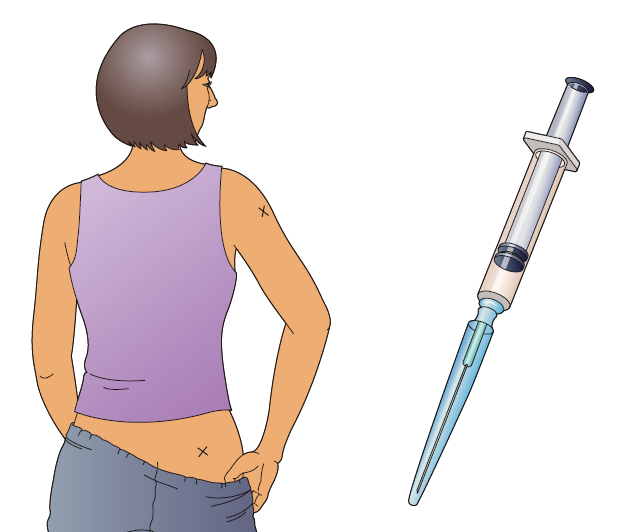Injectable (Depoprovira/Sayana Press)
Providing 2-3 months of contraceptive protection

What is Depoprovira
- The injection is a reversible contraceptive
- The injection contains a chemical called a hormone(progesterone)
- The hormone has several effects on the body
- The hormone in the injection can cause common side effects, mainly related to changes in menstrual bleeding:
- For the first several months, users typically experience irregular bleeding, prolonged bleeding, or frequent bleeding; and later, no monthly bleeding
- Other side effects e.g., weight gain (about 1–2 kg per year), headaches, dizziness, acne, abdominal bloating and discomfort, and mood changes

Effects on fertility
After stopping the injection, there may be a delay in return to fertility of up to one year – However, because there is variation in return of fertility among users, clients who wish to avoid pregnancy should be advised to start another contraceptive method before or at the time of their next scheduled injection
Effects on bone mineral density (BMD):
- During use, DMPA decreases BMD slightly. This is reversible in users aged 18 and older but may increase the risk of developing osteoporosis and possibly having bone fractures later, after menopause.
- For clients with significant lifestyle and/or medical risk factors for osteoporosis, other methods of contraception should be considered
- It is unknown whether BMD loss in adolescents/young women is reversible. Clients < 18 years old must be counselled on this.
- DMPA may be used as contraception in this group after all options have been discussed and considered unsuitable or unacceptable.
HIV risk and DMPA use
Some research suggests that women who use POIs and are exposed to HIV might be more likely to contract HIV than other women. It is not clear whether this is due to the POIs. Further research is ongoing to properly explore this risk.
In countries and programs where many family planning clients are at high risk of HIV, this should be discussed with women interested in POIs.
The injection does not protect against sexually transmitted infections (STIs) or HIV, so dual protection should be discussed/advised.
When to start POIs
- POIs can be given at any time in the client’s menstrual cycle if reasonably certain the client is not pregnant
- Immediately after an abortion or miscarriage
- Six months after childbirth if fully or nearly fully breastfeeding and six weeks after childbirth if partially breastfeeding
- .5 days after taking ulipristal acetate (UPA) or immediately after any other emergency contraceptive pills
- If administered under any of the following conditions, advise use of barrier contraception (condoms) for the next 7 days:
- After day 7 of their menstrual cycle
- After day 7 post-abortion or miscarriage
- More than six weeks after giving birth if partially breastfeeding and monthly bleeding has not returned
- More than six months after giving birth if fully or nearly fully breastfeeding and monthly bleeding has not returned
- More than 4 weeks after childbirth if not breastfeeding and monthly bleeding has not returned.
- After taking emergency contraceptive pills
Sayana press
DMPA-SC (Sayana Press) is a relatively new version of the progestin-only depo medroxyprogesterone acetate (DMPA) injectable contraceptive method, available in some MSI countries.
This is the same “Depo” that you know, it’s just simpler and less painful to inject.
In some countries, DMPA-SC (Sayana Press) is registered for at-home use, meaning clients can take up to 12 months’ supply at home and self-administer their injection, saving them from having to return to a provider every three months for their injection. Providers should ensure clients have been trained on how to self-inject and given pictorial instructions before providing a supply for them to take home.
DMPA-SC (Sayana Press) is injected into the fatty tissue, directly under the skin with a short needle (9.5 mm) instead of a deep intramuscular injection (25-40 mm needle length). DMPA-SC (Sayana Press) has a low dose (104 mg for DMPA-SC versus 150 mg for DMPAIM) of DMPA in a single-use, prefilled injection system called “Uniject”.

DMPA-SC (e.g. Sayana Press) still achieves similar systemic drug levels to DMPA-IM (e.g. Depo-Provera) because the subcutaneous injection allows the lower dose to be absorbed by the body in such a way that it provides essentially the same contraceptive action, effectiveness, benefits, safety and possible side effects as DMPA-IM.
DMPA-SC (Sayana Press) and DMPA-IM (e.g. Depo-Provera) appear to be therapeutically equivalent with similar safety profiles when used by healthy women. That is, DMPA-IM and DMPA-SC (e.g. Sayana Press) have the same side effects and risk profiles. However, injection site reactions seem to be more common with the use of DMPA-SC (Sayana Press). These injection site reactions are generally regarded as mild to moderate. It is currently uncertain to what degree these skin changes are reversible. With typical use, the failure rate of DMPA is approximately 4%. As with DMPA-IM, DMPA-SC (Sayana Press) is given every three months to prevent pregnancy.
Effects on fertility
- After stopping the injection, there may be a delay in return to fertility of up to one year
- However, because there is variation in return of fertility among users, clients who wish to avoid pregnancy should be advised to start another contraceptive method before or at the time of their next scheduled injection
Effects on bone mineral density (BMD)
- During use, DMPA decreases BMD slightly. This is reversible in users aged 18 and older but may increase the risk of developing osteoporosis and possibly having bone fractures later, after menopause
- For clients with significant lifestyle and/or medical risk factors for osteoporosis, other methods of contraception should be considered
- It is unknown whether BMD loss in adolescents/young women is reversible. Clients < 18 years old must be counselled on this
- Clients are generally advised to switch to another method at the age of 45 years. If they don’t wish to stop using DMPA, the client must be aware of the potential risks
- Review the use of DMPA every 2 years in all clients
Find your best fit
If you’re unsure what method is best for you, take our online contraception quiz.

If you’re considering an Injectable, or thinking about using a new method of contraception, it’s a good idea to have a full consultation.
Call us toll-free for a confidential talk on:











